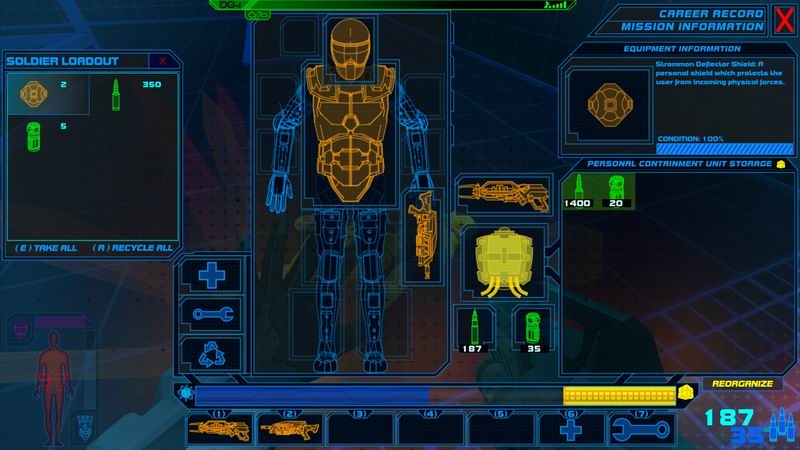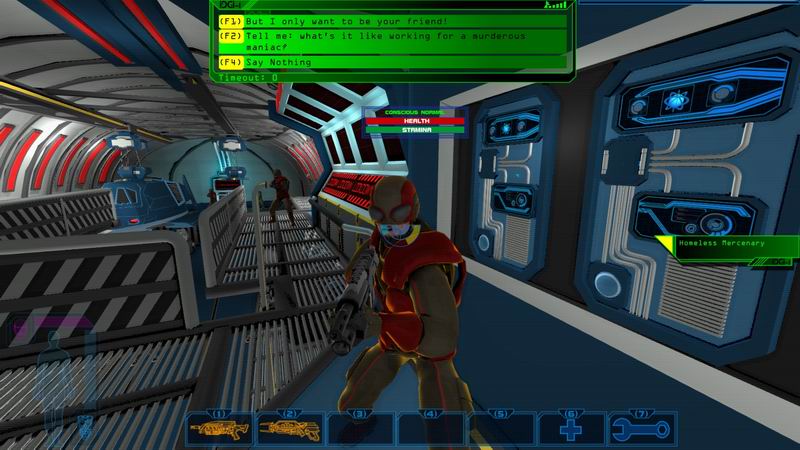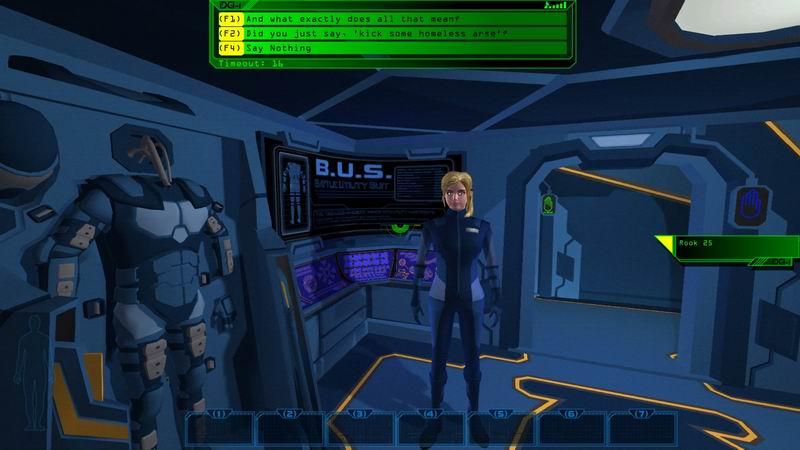You are staring at your computer screen; you are literally you. And now, through the wonder of modern technology, you can jump into the mind of, and take over, the security head of a near-future corporation's flying fortress. You control his speech, movements, decisions. That's how Consortium starts.
You jump into Bishop 6's head just as he wakes up for his first shift on the Zenlil plane/fortress of the global Consortium security force. The game uses Bishop 6's status as new kid, and your status as new kid inside Bishop 6, to toy with you throughout.
Other staff onboard regularly ask you questions or offer you dialogue options which you may only partially understand – offering glimpses into a broader backstory and Bishop 6's history. At the same time, your monitor fuzzes over and breaks up if you try to do something Bishop 6 simply wouldn't or can't do, and some characters intimate they know more about the fact you're controlling Bishop 6 than they should.
 This central fourth wall-breaking conceit also neatly sidesteps many of the logical confusions of videogames. Reloading a saved game now is exploring an alternate timeline of events; your heads-up display and controls are now your mechanisms to engage with Bishop 6 etc.
This central fourth wall-breaking conceit also neatly sidesteps many of the logical confusions of videogames. Reloading a saved game now is exploring an alternate timeline of events; your heads-up display and controls are now your mechanisms to engage with Bishop 6 etc.
It's an interesting concept, but sadly one that's used to little effect. Yes, characters intimate they know you're not really Bishop 6. But that has ultimately little effect on the actual play. That rapidly settles into a a low-rent, talkier Mass Effect clone. Which in itself is no bad thing – in the end, in fact, it could have been better just to concentrate on the shooting and talking a bit more and the clever meta-narrative a bit less.
Dialogue here is often handled really well – with some good characterisations, intriguing dialogue options and a good mix of the mundane and urgent to keep you on your toes, plus some nicely drawn characterisations. But far too often the building atmosphere is punctured by the insertion of cardboard cutout enemies, or even self-sabotaged by the game.
 The worst example of this is the fact that nearly all the game's characters are referred to by an infuriatingly generic combination of a number and a chesspiece. So, to kickstart a task you will quite often be told something like "If you want to know more about Pawn 6's murder, go talk to Rook 3, Pawn 23 or Knight 2". Given the entire crew wears standard issue blue uniforms, this really isn't helpful.
The worst example of this is the fact that nearly all the game's characters are referred to by an infuriatingly generic combination of a number and a chesspiece. So, to kickstart a task you will quite often be told something like "If you want to know more about Pawn 6's murder, go talk to Rook 3, Pawn 23 or Knight 2". Given the entire crew wears standard issue blue uniforms, this really isn't helpful.
On top of that, combat, when it does come (rarely), is woeful – where the Mass Effect series felt increasingly involving, this feels stilted and dull. Inventory management is also annoying. And the game is over in a flash – it's part of a planned trilogy, if it raises enough funds from this first game.
That said, there's enough unusual ideas here it'll be interesting to see where developers iDGi go next with their curious mix of talky role-playing, complex sci-fi setting and meta-game narrative.
- Consortium is out now for PC. Developed and published by iDGi
- Read other gaming reviews on The Arts Desk
- Simon Munk on Twitter















Comments
Add comment